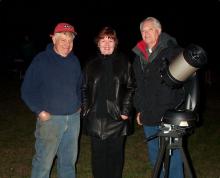Feed aggregator
Universe decays faster than thought, but still takes a long time
The universe is decaying much faster than thought. This is shown by calculations of scientists on the so-called Hawking radiation. They calculate that the last stellar remnants take about 10^78 years (a 1 with 78 zeros) to perish. That is much shorter than the previously postulated 10^1100 years (a 1 with 1100 zeros).
Astrophysicist searches for ripples in space and time in new way
Massive ripples in the very fabric of space and time wash over Earth constantly, although you'd never notice. An astrophysicist is trying a new search for these gravitational waves.
The Squid Galaxy's neutrino game just leveled up
In space, energetic neutrinos are usually paired with energetic gamma rays. Galaxy NGC 1068, however, emits strong neutrinos and weak gamma rays, which presents a puzzle for scientists to solve. A new paper posits that helium nuclei collide with ultraviolet photons emitted by the galaxy's central region and fragment, releasing neutrons that subsequently decay into neutrinos without producing gamma rays. The finding offers insight into the extreme environment around the supermassive black holes at the center of galaxies like NGC 1068 and our own and enhances our understanding of the relationships between radiation and elementary particles that could lead to technological advances we haven't yet imagined.
Stellar collapse and explosions distribute gold throughout the universe
Magnetar flares, colossal cosmic explosions, may be directly responsible for the creation and distribution of heavy elements across the universe, suggests a new study.
NASA's NICER maps debris from recurring cosmic crashes
Astronomers have probed the physical environment of repeating X-ray outbursts near monster black holes thanks to data from NASA's NICER (Neutron star Interior Composition Explorer) and other missions.
Gaia spots odd family of stars desperate to leave home
The European Space Agency's Gaia mission has spotted an unusual family of stars all strangely eager to leave home -- a family we couldn't have discovered without the star-surveying spacecraft, and one unlike all others we have spotted to date.















